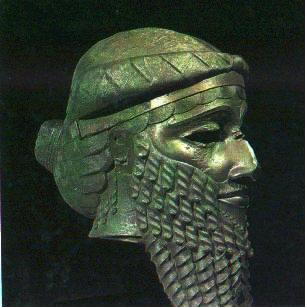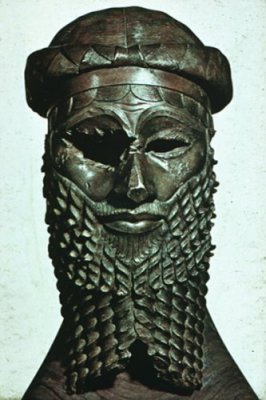|
(~2300 BCE)
Die Legende von Sargon von Akkad
Ancient Near Eastern Texts
119
1. Sargon, der mächtige König
von Akkadien bin Ich,
2. Meine Mutter war einfach und bescheiden;
meinen Vater kannte ich nicht;
3. Der Bruder meines Vaters wohnt in den
Bergen.
4. Meine Stadt ist Azupiranu, welche am
Ufer des Purattu [Euphrat] liegt.
5. Meine bescheidene Mutter empfing mich,
heimlich
brachte
sie mich fort.
6. Sie legte mich in einen Korb
aus Schilfrohr, sie verschloß meinen Zugang mit Erdpech,
7. Sie warf mich in den Fluß
der mich nicht überspülte.
8. Der Fluß trug mich, er
brachte mich zu Akki, den Bewässerer.
9. Akki, der Bewässerer,
in seiner Güte seines Herzens zog mich heraus,
10. Akki, der Bewässerer, als seinen
eigenen Sohn zog er mich auf.
11. Akki, der Bewässerer, als seinen
Gärtner
bestimmte er mich.
12. Als ich ein Gärtner
war liebte mich die Göttin Ishtar [Venus],
13. Und für 4 Jahre hersschte ich
über ein Königreich.
14. Ich herrschte über die schwarzköpfigen
Menschen und regierte.
15. Ich zerstörte mächtige Berge
mit Axten aus Bronze (?).
16. Ich stieg auf in die hohen Berge;
17. Ich brach aus aus den kleinen Bergen.
18. Das Land des Meeres habe ich
dreimal besiegt.
19. Ich habe Dilmun
mit meiner
Hand
erobert.
20. Ich ging hinauf zum grossen
Dur-ilu, Ich ...
21. ..... Ich veränderte ...
22. Was sich auch immer als König
erhebt nach mir,
23. .....
24. Lasse ihn herrschen, lasse ihn regieren,
die schwarzköpfigen Menschen.
25. Mächtige Berge lasse ihn zerstören
mit Äxten aus Bronze;
26. Lasse ihn aufsteigen die hohen
Berge,
27. Lasse ihn ausbrechen aus den kleinen
Bergen,
28. Das Land der Meere lasse ihn besiegen
dreimal;
29. Lasse ihn Dilmun *) mit
seiner Hand erobern ;
30. Zum grossen Dur-ilu
lasse ihn hinaufgehen.
[Source: George A. Barton,
Archaeology and The Bible, 3rd Ed., (Philadelphia: American Sunday-School
Union, 1920), p. 310.]
|
|
THE LEGEND OF SARGON
[Ancient Near Eastern Texts
119]
Sargon, the mighty king, king of Agade,
am I.
My mother was a changeling, my father
I knew not.
The brother(s) of my father loved the
hills.
My city is Azupiranu, which is situated
on the banks of the Euphrates.
My changeling mother conceived me, in
secret she bore me.
She set me in a basket of rushes, with
bitumen she sealed My lid.
She cast me into the river which rose
not (over) me,
The river bore me up and carried me to
Akki, the drawer of water.
Akki, the drawer of water lifted me out
as he dipped his e[w]er.
Akki, the drawer of water, [took me] as
his son (and) reared me.
Akki, the drawer of water, appointed me
as his gardener,
While I was a gardener, Ishtar granted
me (her) love,
And for four and [ ... ] years I exercised
kingship,
The black-headed [people] I ruled, I gov[erned];
Mighty [moun]tains with chip-axes of bronze
I conquered,
The upper ranges I scaled,
The lower ranges I [trav]ersed,
The sea [lan]ds three times I circled.
Dilmun my [hand] cap[tured],
[To] the great Der I [went up], I [. .
. ],
[ . . . ] I altered and [. . .].
Whatever king may come up after me,
[. . .]
Let him r[ule, let him govern] the black-headed
[peo]ple;
[Let him conquer] mighty [mountains] with
chip-axe[s of bronze],
[Let] him scale the upper ranges,
[Let him traverse the lower ranges],
Let him circle the sea [lan]ds three times!
[Dilmun let his hand capture],
Let him go up [to] the great Der and [.
. . ]!
[. . .] from my city, Aga[de ... ]
[. . . ] . . . [. . .].
(Remainder broken away.)
Source: From: George A. Barton,
Archaeology and The Bible, 3rd Ed., (Philadelphia: American Sunday-School
Union, 1920), p. 310. Scanned by: J. S. Arkenberg, Dept. of History, Cal.
State Fullerton. Prof. Arkenberg has modernized the text.
 *) "The first known account of a paradisial
garden appears on a cuneiform tablet from ancient Sumer. Here we learn
of the mythical place called Dilmun, a pure,
clean,
bright
place where sickness, violence, and old age do not
exist. At first this paradise lacks only one thing:
water. Eventually
this is provided by the Sumerian water god, Enki. At once, Dilmun
is transformed into a garden of fruit trees, edible plants, and flowers.
Dilmun,
however, is a paradise for the gods alone and not
for human beings, although one learns that Ziusudra (= Utnapishtim,
the
Sumerian counterpart of Noah) was exceptionally admitted to the
divine garden."
*) "The first known account of a paradisial
garden appears on a cuneiform tablet from ancient Sumer. Here we learn
of the mythical place called Dilmun, a pure,
clean,
bright
place where sickness, violence, and old age do not
exist. At first this paradise lacks only one thing:
water. Eventually
this is provided by the Sumerian water god, Enki. At once, Dilmun
is transformed into a garden of fruit trees, edible plants, and flowers.
Dilmun,
however, is a paradise for the gods alone and not
for human beings, although one learns that Ziusudra (= Utnapishtim,
the
Sumerian counterpart of Noah) was exceptionally admitted to the
divine garden."
- An Encyclopedia
of Archetypal Symbolism
*
*) "Die erste bekannte Erwähnung
von einem paradisischen Garten stammt von einer Cuneiform Tafel
(Keilschrift) aus dem alten Sumer. Er wird dort als mythischer Ort
Dilmun genannt, ein reiner, sauberer, heller
Ort, wo Krankheit, Gewalt, und Alter nicht existiert.
Diesem Paradies mangelt es nur an Einem: Wasser. Eventuell wird
dieses von dem Sumerischen Wasser-Gott Enki geliefert. Zugleich
ist Dilmun die Transformation in einen Garten von Bäumen mit genussvollen
Früchten, Pflanzen und Blumen. Dilmun ist jedoch als paradisischer
Garten allein nur für die Götter zugänglich, nicht
aber für die Menschen, obgleich bekannt ist, daß Ziusudra
(= Utnapishtim "Der das Leben gesät hat" "He Who Saw
Life" , der in der biblischen Mythologie als Noah bekannt ist, und
den Gilgamesh im gleichnamigen
Epos aufsucht) ausnahmsweise Zutritt hatte zu dem heiligen Garten.
- An Encyclopedia of Archetypal
Symbolism
Siehe dazu auch diese Seiten:
Der
Baum des LebensDie GöttinGilgamesh
Epos
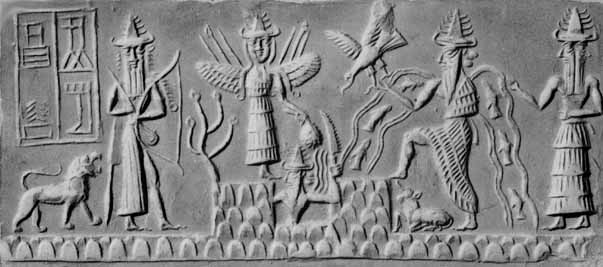
Der Sumerische Wasser-Gott
Enki
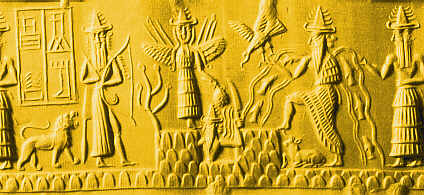
Der Sumerische Wasser-Gott
Enki
*
"Pure was Dilmun
land!
Virginal was Dilmun land! [snip] The lion slew
not, the wolf was not carrying off lambs,
[snip] No eye-diseases said
there: 'I the eye-disease.' No headache said there: 'I headache.' No old
woman
belonging to it said there:
'I old woman.' No old man belonging to it said there: 'I old man.'
{The Harps That Once...Sumerian
Poetry in Translation, Thorkild Jacobsen (Yale, 1987) pgs. 185-186 }
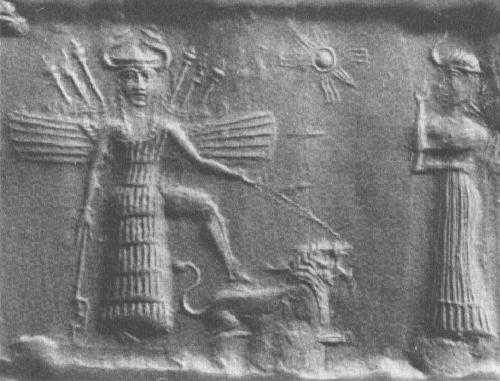
Die Göttin Ishtar (Venus)

Die Göttin Ishtar (Venus)
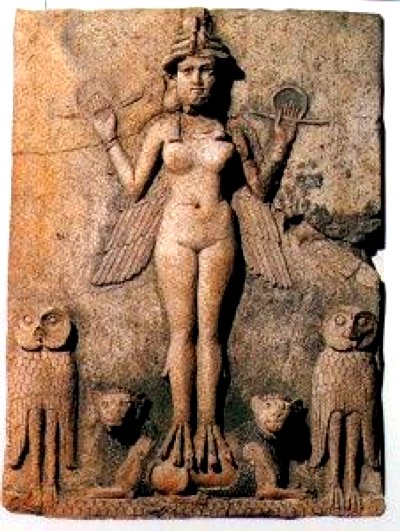
Lillith
1.Holy is [the place] where you are;
2.The mountain Dilmun is holy.
3.Holy is the place where you are;
4.......the mountain Dilmun is is holy.
5.The mountain Dilmun is holy, the mountain Dilmun is pure,
6.The mountain Dilmun is pure; the mountain Dilmun is brilliant.
7.Alone in Dilmun they lay down;
8.Where Enki and his consort lay,
9.That place is pure; that place is brilliant.
10.Where Enki and Ninella lay,
11.That Place is pure, that place is brilliant.
12.In Dilmun the raven cried not,
13.The dar-bird its dar-cry uttered not.
14.The deadly lion destroyed not,
15.The wolf a lamb seized not,
16.The dog the weak kid tore not,
17.The dun-animal (sow) the food-grain destroyed not,
18.The planned not for young off spring...
19.The birds of heaven their offspring hatched not,
20.Doves laid noteggs (?)_
21.Of eye-disease, "it is eye-disease," one said not;
22.Of headache, "it is headache," one said not.
23.To a mother, "mother," one said not,
24.To a father, "father," one said not.
25.In the holy place a libation was poured not; in the city one drank not;
26.The river-man "cross it?" said not;
27.The overseer filled no right hand;
28.The musician "sing," said not;
29.The prince of the city spoke not.
30.Ninella to her father Enki Said:
31."A city thoust founded, a city thou hast founded, its destiny thou hast
fiexe;
32.In Dilmun a city thou has hast founded,
33.......thou hast founded a city,
34.........a canal there is not
35...;;;.....thou hast founded a city."
"The rest
of the first column is broken away; probably about nine lines are missing.
All the first column is descriptive of a place inhabited only by a god
and godess. Many activities are absent, because there is no one
there to carry them out. Lines 16-21 remind one a little of Isaiah 11:6-i
The wolf also shall dwell with the lamb, and the leopard shall lie down
with the kid; and the calf and the young lion and the fatling together;
and a little child shall lead them. Isaiah 11:6 And the cow and
the bear shall feed; their young ones shall lie down together: and the
lion shall eat straw like the ox. Isaiah 11:7 And the sucking
child shall play on the hole of the asp, and the weaned child shall put
his hand on the cockatrice den. Isaiah 11:8 They shall not hurt
nor destroy in all my holy mountain: for the earth shall be full of the
knowledge of the Lord, as the waters cover the sea. Isaiah 11:9
Source: Prior to 2000 B.C. From: George
A. Barton, Archaeology and The Bible, 7th Edition revised, (Philadelphia:
American Sunday School, 1937), pgs 337-338
I, Nikhursag, brought forth for the people;
what is my reward? Enlil, the begetter, answered the rebellious
one:Thou, Nikhursag,
hast brought forth people;
You should
always remember that the "gods" were very often important men of invention,
discovery or
literature.
If Jubal was the "father" of the musical instruments and musicians, Genun
is thought to have
gained
his skill from Lucifer. One who invented the bow would, after death, be
worshipped as a god.
1..................................................
2..................................................
3..................................................
4..................................................
5..................................................
6..................................................
7.[The wood-plant grew,]
8.The salt-plant] grew,
9.[the..... plant] grew,
10.{The a-par-shar-plant] grew
11.[The tu-tu-plant] grew,
12.[The.....plantj] grew,
13.[The.....plant] grew,
14.[The cassia] plant grew,
15."O Enki, for me they are brought forth, they are brought forth."
16.To his messenger, Usmu, he spoke, he said:
17."The plants--their fate forever [I have determined."]
18.What is this? What is this?"
19.His messenger, Usmu, returned:
20................
21."My king has commanded the wood-plant,
22.That it may be cut off and eaten.
23.My king has commanded the salt plant,
24.That it may be cut off [and eaten"]
25.My king hgas commanded the a-pa-shar-plant,
26.That it may be cut off and eaten.
27.[My kingj] has commanded the tu-tu-plant,
28.[That it may be cut off] and eaten
29.[My king] has commanded the ......plant,'
30.[That it may be cut off and eaten,]
31.[My king has commanded the.....pplant,]
32.[That it may be cut off and eaten.
33.[My king has commanded the .....plant,]
34.[That it may be cut off and eaten.
35.[My king] has commanded the cassia plant,
36.That it may be cut off and eaten."
37.By Nikursag in the name of Enki a curse was uttered:
38."The face of life, when he dies, he shall never see [again]."
39.The spirits of the earth in the dust sat down.
40.The rebellious one to Enki said:
41."I, Nikhursag, brought forth for the people; what is my reward?"
42.Enlil, the begetter, answered the rebellious one:
43.Thou, Nikhursag, hast brought forth people;
44.In my city I will make two thrones (?) and thy name shall be called
on there.
45.As a dignitary her head alone is exalted;
46.Her heart alone is changed;
47.Her eye alone is endowed with light."
"The last
three lines here refer to Takku, who would seem to be in some way a representative
of humanity.
Nikhursag,
jealous of her, has denied immortality to man. Enlil explains to her that
she need not be jealous
of her
offsprring as a whole; that none but Takku will be granted immortality.
There is no reference, as
Langdon
once supposed, to the fall of man."
Source:
Prior to
2000 B.C.From: George A. Barton, Archaeology and The Bible, 7th Edition
revised,
(Philadelphia:
American Sunday School, 1937), pg.340 |
